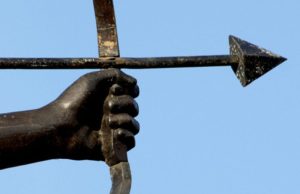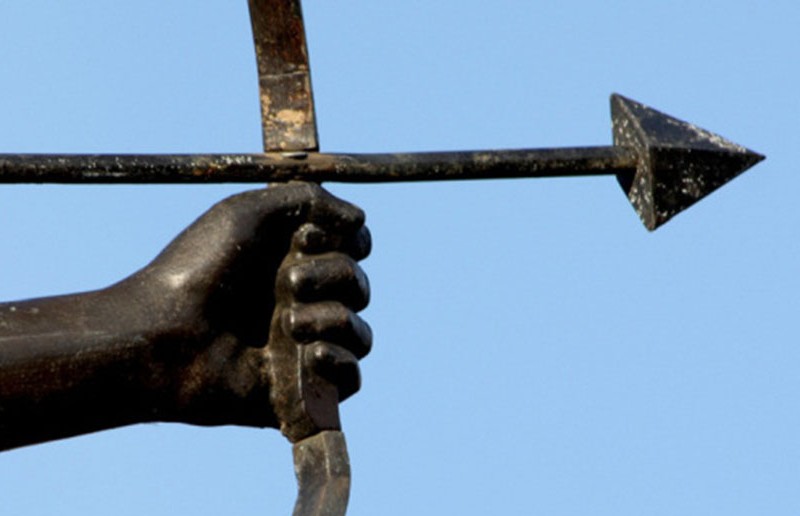Telling ‘Noble and Good Men from the Rest’: UAVs and the Prisoner taken at Sphacteria

By Dr Chris Wyatt
The situation of soldiers coming under fire and attack from other soldiers incurring risk of injury or death has, to some degree, been considered to be something of a fair fight. As we look to the ongoing centenary of the Great War, we also look back to a period where that element of fairness characterised, for the most part, the war that was fought.
Even if, in the West, the Christmas Truce was a one-off, there was still the widespread perception as the war went on that the soldiers on the other side shared each other’s discomfort, risk and ultimately death – The trenches, lice, rats, mud, shelling, mines and phosgene all combined to create a common, mutually intelligible, experience. [1]
What happens when that element of fairness is not present and when one side possesses an advantage over the other? History is full of instances of this, whether the protagonists are heavy armed hoplites, Mongol cavalry, conquistadors or the European Empires of the Nineteenth Century. The mitigating factor is the ability to project power at distance and be protected against attack. The former could either be along a line of sight a distance away or it could be beyond line of sight. In the latter, protection reduces vulnerability even in proximity which, itself, does not confer fairness. In both cases, there is little those on the receiving end can do when confronted with a projectile against which it is impossible to respond and it is easy to see Kipling’s dismay at the loss of an expensively trained officer to a ‘ten rupee jezail’. [2]
Snipers have always had the same sort of reputation as the jezail’s wielder and their ability has sometimes resulted in unpopularity with the rank and file, so often at the receiving end of this form of warfare. Before the use of firearms, the Spartans viewed the use of the arrow as unmanly and scorned it as such, terming them ‘spindles’, or atraktos. [3] For some time, they were content not to use it and die if necessary, Thermopylae being a good case in point. During the Peloponnesian War a Spartan force got stuck on the island of Sphacteria and, unable to project the level of force to which they were subjected, surrendered. Thucydides wrote:
Nothing that happened in the war surprised the Hellenes so much as this. It was the general opinion that no force or famine could make the Spartans give up their arms, but that they would fight on as they could, and die with them in their hands: indeed people could scarcely believe that those who had surrendered were of the same stuff as the fallen; and an Athenian ally, who some time after insultingly asked one of the prisoners from the island if those that had fallen were noble and good men, received for answer that the atraktos – that is, the arrow – would be worth a great deal if it could pick out noble and good men from the rest; in allusion to the fact that the killed were those whom the stones and arrows happened to hit.[4]
The Spartan prisoner’s point is about three things:
- The use of sight at distance and beyond line of sight is conferring some sort of unfair advantage for the enemy;
- The perception of a lack of ethics and/or some form of moral cowardice in using weapons at a distance;
- The question of how discriminating it might be, especially en masse. For the prisoner, the question is of its inability to pick a target out, though indiscrimination might apply if a densely packed group were under a volley of arrows.
While this may have been valid in Ancient Greece, it is less so today. The role of technology is evolving and the complaints of our friend from Sparta seem less plaintive as time goes on.
Unmanned Aerial Vehicles (UAVs) are today criticised in similar terms to the arrow then. Leaving aside the fact of one being a weapons platform and part of an integrated system and the other just being a projectile, does the fact of war waged at distance really confer such a disadvantage? – and is it unfair? After all, the Spartans could have embraced technologies such as the bow. Everyone else did. If they did not, they had only themselves to blame, having learned nothing from Thermopylae, where:
Whenever they shot their arrows, the sun was blocked by their number. Dienekes [the Spartan] was not alarmed to hear this but rather, in total disregard for the vast number of Medes, said that what his Trachinian friend had reported was in fact good news, since it meant that while the Medes were blocking the sun, they would fight them in the shade.[5]
Dienekes did not survive the battle but, beyond his undoubted bravery and bravado, would have seen things the same way as the prisoner taken at Sphacteria several decades later. Yes the issue is less whether it is fair than whether fairness really matters.
The need of the state to protect its civilians, as per Hobbes and Rousseau, is one thing – protecting the protectors has until recently been another. The recent UK Supreme Court ruling, applying the European Convention on Human Rights, ‘places a legal responsibility on the MOD to mitigate risks to soldiers’ lives by all feasible means.’[6] UAVs are just such a means, whether improving situational awareness or undertaking force protection.
The perception of a lack of ethics and/or some form of moral cowardice in using weapons at a distance is more likely to be felt by an enemy without UAVs or air power than a state which does, or at least can, compete with Powers like the UK and US. Cultural factors matter, too, and a Pashtun is likely to see recourse to the use of weapons at a distance as unmanly, unethical and cowardly, in a way that a Western person would not. The Pashtun concept of tura, which is the demand for bravery, has its origins in an older use of tura, meaning sword and the concept of bravery has a strong element in facing the enemy.[7] A strike from the air is seen as flying in the face of the notion of tura yet UK or US servicemen and women would not see it that way and appreciate the advantages force protection can bring. It is unlikely the two sides would ever see eye-to-eye.
UAV strikes are also not the massed volleys we see at Thermopylae and Sphacteria. They are far more precise, being able to loiter and wait for the appropriate time and in recent times UK operators have pursued a policy of attempting to have no civilian casualties. So could UAVs be the first weapons to be able to ‘pick out noble and good men from the rest’? There is probably some way to go before that happens but in time they might be seen to have been the precursors to a system which can.
Dr Chris Wyatt is a Research Fellow at the Institute for Conflict, Cooperation and Security at the University of Birmingham and is currently an associate on the project ‘The Political Effects of Unmanned Aerial Vehicles on Conflict and Cooperation Within and Between States’. His research interests involve the history and politics of Afghanistan and the region surrounding it. He is also interested in terrorism, insurgency and military issues more generally.
[1] See, for Example, Richard Van Emden – Meeting the Enemy: The Human Face of the Great War, Bloomsbury 2014.
[2] Rudyard Kipling – ‘Arithmetic on the Frontier’, Departmental Ditties and Other Verses, 1886.
[3] The connotation of their unmanliness and of their being symbols of Greek womanhood is at: Herodotus – The Histories, Book Four, 4.162.5, in Robert B Strassler – The Landmark Herodotus: The Histories, Quercus 2008, page 348.
[4]Thucydides – History of the Peloponnesian War, Book Four, 4.40, in Robert B Strassler – The Landmark Thucydides: A Comprehensive Guide to the Peloponnesian War, Free Press 2008, page 244.
[5] Herodotus in Strassler Op Cit. Book Seven, 7.226, page 593.
[6] Wing Commander Guy Edwards – ‘Military Autonomous and Robotic Systems: Considerations for the Way Forward from a UK Perspective’, Air Power Review, Volume 16, Number 3, Autumn/Winter 2013, page 53.
[7] Lutz Rzehak: Doing Pashto: Pashtunwali as the ideal of honourable behaviour and tribal life among the Pashtuns, Afghan Analysts Network 2011, pages 10 and 11.
Image source: Flickr/ Leo Reynolds




